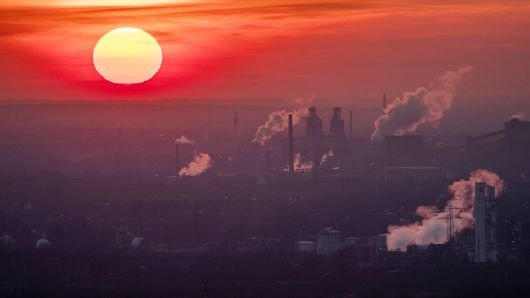2016 is likely to have been the hottest year since global temperatures were recorded in the 19th century.
The heat is on for 4 more years: Extreme temperatures expected through 2022
Doyle Rice
Published 46 Mins Ago
USA Today
2016 is likely to have been the hottest year since global temperatures were recorded in the 19th century.
Getty Images
2016 is likely to have been the hottest year since global temperatures were recorded in the 19th century.
This summer's heat has shattered records around the Northern Hemisphere, from Algeria to Canada and Japan to California. New research suggests this could be only the beginning of a four-year global "warm spell."
Using a new forecasting technique, scientists in a study published Tuesday predict that the rest of 2018 through 2022 may be warmer than expected around the world as human-caused global warming and natural factors combine to heat the planet.
"The coming warm period is associated with an increased likelihood of intense to extreme temperatures," the study says.
Scientists say that although the Earth will be warmer than average overall, it may not be hot everywhere for everyone:
"We are not predicting another heat wave – a warmer year doesn't always mean (that)," study lead author Florian Sevellec told Deutsche Welle. "That's because the forecast only covers global mean temperatures, not regional temperatures in certain parts of the world."
The past four years have been the Earth's four warmest on record (2016, 2017, 2015 and 2014, respectively).
Man-caused climate change, aka global warming, is caused by greenhouse gas emissions from the burning of fossil fuels such as coal, oil and gas.
Though the overall trend is for rising temperatures, warming does not occur in a straight line and can wobble from year to year. "Global warming is not a smooth, monotonous process," the study says.
Scientists say the warming trend appeared to lapse in the early 21st century, a phenomenon known as a global warming "hiatus."
The researchers built their forecasting system by statistical "hind-casting," according to The Guardian. This crunches the data from previous climate models to measure which combination was most effective in predicting past temperature trends.
Looking back, the study successfully recreated that so-called hiatus, meaning it has some skill at seeing bumps in the overall warming trend.
Weather.us meteorologist Ryan Maue, who was not involved in the research, wonders whether the study "was really telling us anything new. The methodology is a statistical fit to previous (historical) data and climate model scenarios."
In addition, he says, "there are no physics here – no El Niño or ocean dynamics."
"The extreme warmth of … 2016 was caused by the strong El Niño, and we have been 'stepped up' at the global temperature level now for two to three years," Maue says. "Thus, to skillfully predict global temperatures, you need to replicate the mechanisms that are actually changing the global temperature (such as El Niño)."
The study's predicted warmth is not a sure thing: The research says there's a 58 percent chance that the world's temperature over the next four years will be unusually warm. There's a 69 percent chance the oceans will be warmer than normal.
Beyond 2022, forecasts are blurry, according to Deutsche Welle. The model simply does not function well when looking further into the future, said Sevellec, a scientist at France's National Center for Scientific Research.
The study was published in the peer-reviewed British journal Nature Communications.

Congratulations @doctorart! You have completed the following achievement on Steemit and have been rewarded with new badge(s) :
Click on the badge to view your Board of Honor.
If you no longer want to receive notifications, reply to this comment with the word
STOPDownvoting a post can decrease pending rewards and make it less visible. Common reasons:
Submit
Hi! I am a robot. I just upvoted you! I found similar content that readers might be interested in:
https://www.usatoday.com/story/tech/science/2018/08/14/global-warming-least-4-more-years-extreme-temperatures-likely/986099002/
Downvoting a post can decrease pending rewards and make it less visible. Common reasons:
Submit
Congratulations @doctorart! You received a personal award!
You can view your badges on your Steem Board and compare to others on the Steem Ranking
Downvoting a post can decrease pending rewards and make it less visible. Common reasons:
Submit